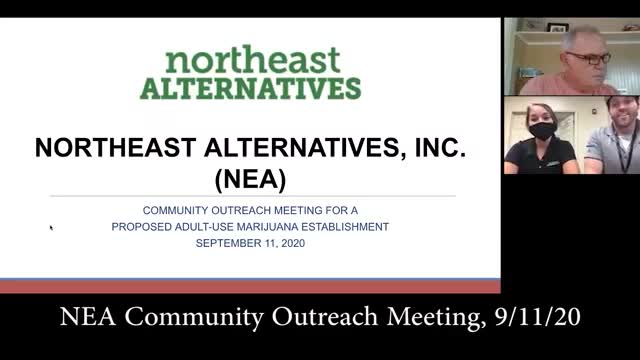Northeast Alternatives proposes 90,000-square-foot cultivation and manufacturing facility at 310 Kenneth Welch Drive in Lakeville
Get AI-powered insights, summaries, and transcripts
Subscribe
Summary
Northeast Alternatives (NEA) representatives presented plans on an outreach call for a proposed cannabis cultivation and product-manufacturing facility at 310 Kenneth Welch Drive in the Town of Lakeville.
Northeast Alternatives (NEA) representatives presented plans on an outreach call for a proposed cannabis cultivation and product-manufacturing facility at 310 Kenneth Welch Drive in the Town of Lakeville. NEA said the facility would not include retail sales and would operate as a wholesale cultivation and manufacturing site if it receives state licensing.
The proposal matters to Lakeville because NEA expects to create jobs, enter a host-community agreement that would provide monetary benefits to the town beyond property taxes, and operate a large industrial facility within the town’s zoning and buffer rules. Company leaders said they will comply with Massachusetts law and Cannabis Control Commission (CCC) regulations and will share security video and processes with local police.
Kyle Bishop, NEA’s chief operating officer and co-owner, and Hillary King, director of wholesale, led the presentation and described the planned operations and compliance steps. King said the company has already submitted a cultivation application and that this meeting was part of the required community outreach for a production/manufacturing license. “Once we submit our complete application, the commission will respond within 90 days to give a provisional license,” King said. She described subsequent steps including architectural approval and CCC on‑site inspections before a final license is issued.
NEA described the proposed site as a roughly 90,000-square-foot facility with an estimated canopy of about 50,000–55,000 square feet used for cultivation. The company told the board it expects to employ roughly 30 to 40 full‑time workers and to work with local contractors and vendors. Bishop said the facility would be wholesale-only and “there’ll never be a time that we’re going business to consumer” from that location; NEA advised it would not sell directly to consumers or make home deliveries from the Lakeville site.
Company representatives described multiple compliance and safety measures. These included independent laboratory testing of cannabis products and growing media; an integrated pest management program (no pesticides or fungicides used in Massachusetts-style IPM); security systems with perimeter alarms, HD interior and exterior video surveillance operational 24/7, duress alarms connected to local law enforcement and redundancy for alarm failures; visitor logs and visible ID badges for all authorized visitors; and procedures restricting access to registered agents and approved contractors. Bishop said NEA would provide Lakeville Police Department access to surveillance feeds and maintain a current access list.
NEA also outlined odor and environmental controls. The company said it will use carbon filtration, negative‑ and positive‑pressure air strategies, and additional odor‑mitigation sprays and systems similar to those used at waste‑management facilities. Bishop said those systems are designed to prevent odors from escaping neighboring properties and to capture humidity and waste heat for energy efficiency. NEA said its facilities will meet CCC energy standards, citing the 36 watts per square foot rule, and described planned cogeneration and heat‑recapture systems meant to reduce electricity costs and the site’s environmental footprint.
On production volumes, NEA provided a figure of approximately 15,000 pounds or more produced annually from the Lakeville facility, but company representatives also spoke of converting some flower into infused products rather than reporting an exact annual output solely as flower. The company said product manufacturing would follow food good‑manufacturing practices and that all edible products would be prepared on food‑grade surfaces, packaged securely, and labeled according to CCC rules.
Selectmen asked questions about the company’s other Massachusetts operations, security and shared site arrangements, odors and pest control, staffing, and the project timeline. Rich Lecammer, chairman of the Board of Selectmen, asked whether NEA had an operating facility in Fall River; NEA confirmed it operates a co‑located cultivation and dispensary site on William S. Canning Boulevard and described that operation as currently running. Leah Fabian, Selectman, and Brian Day, Selectman, asked about home delivery and whether NEA would participate; company representatives said the Lakeville site would not conduct deliveries to residences and that the business model for the site is business‑to‑business wholesale only.
NEA said it expects to work with the town on any reasonable special permit conditions and to respond to community concerns raised during outreach. On a tentative timetable, NEA said timing depends on state licensure and local approvals; company representatives said they “hope it to be . . . as soon as possible next year” but did not provide a firm start date.
There were no formal votes or actions taken by the Board of Selectmen during the presentation; the session was a community outreach and Q&A. The Selectmen encouraged residents to submit questions to the Selectmen’s office for follow up.
NEA presenters at the meeting included Kyle Bishop (COO, co‑owner), Hillary King (director of wholesale), Rich Rosier (CRO/CFO), Zach Cooper (CPO, co‑owner), Chris Harkins (CEO, absent), and a retail leader identified as Grant (last name not specified). Town participants who spoke during the Q&A included Rich Lecammer (chairman, Board of Selectmen), Leah Fabian (Selectman), and Brian Day (Selectman).
For now, NEA’s next steps are to finalize its CCC application packet, pursue provisional licensure, continue local engagement with Lakeville officials, and work through architectural approvals and CCC inspections before seeking a final license to operate.
